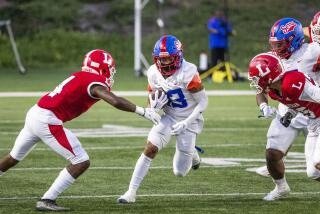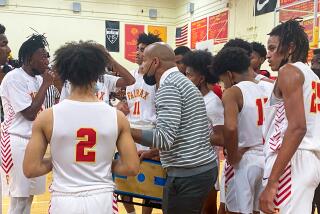In the head game
- Share via
High school athletes who suffer concussions sometimes are allowed to get back into the game prematurely, a decision that risks potentially grave brain injury.
In the most comprehensive study to date of high school athletes and concussions, University of Pittsburgh researchers found that even light concussions can cause more serious damage than originally believed by scientists, impairing mental functioning for a week or more after the initial incident. The conclusion calls into question a guideline commonly used in scholastic sports that permits an athlete with an apparently mild head injury or possible concussion to return to the sport if their symptoms have disappeared within 15 minutes after the injury.
“Our findings underscore the need for more careful on-the-field evaluation of even seemingly mild concussions,” said principal investigator Mark Lovell, a neuropsychologist and director of the University of Pittsburgh Sports Medicine Concussion Program. “Any high school athlete with a suspected concussion of any severity [should] be kept out of that particular game.”
About 1.25 million high school students play contact sports each year, making them the largest single group at risk of sports-related concussions. About 63,000 of them suffer a concussion each year while playing organized sports. But even that figure might be low, according to researchers.
“A lot of concussions go under the radar,” said Michael Collins, assistant director of the University of Pittsburgh’s concussion program, “because the athletes, trainers and coaches may not recognize all the symptoms.”
A concussion occurs when the brain is violently rocked back and forth inside the skull due to a blow to the head or upper body. The injury can sometimes temporarily knock someone out. Other symptoms include disorientation, headaches, confusion, dizziness and amnesia. While a potentially serious injury, a concussion, when allowed to properly heal, does not permanently damage the brain.
When an athlete returns to play before fully recovering, he or she is at the greatest risk for serious brain injury, say researchers. A lingering condition can lower the threshold for subsequent concussions and increase their severity, the studies said. Athletes with multiple concussions can easily develop acute sleeping, memory and attention problems.
“It’d be like your Pentium III chip suddenly became a Pentium II,” said Collins. “Or worse.” In the last five years, about 30 high school athletes have died because of concussions, according to researchers.
Too often, coaches and trainers rely on the self-reporting of athletes who often are eager to return to the game, researchers said. While athletes often reported feeling significantly better by the fourth day after suffering a concussion, the study found that their brains did not fully recover until seven to eight days after injury.
The University of Pittsburgh study investigated 88 high school athletes from across the country who sustained concussions during the 2000-01 school year. Football accounted for about two-thirds of injuries; the rest were divided among soccer, basketball, baseball, ice hockey, lacrosse, cheerleading and wrestling. The results already have been published in a number of sports medicine and neurological journals.






